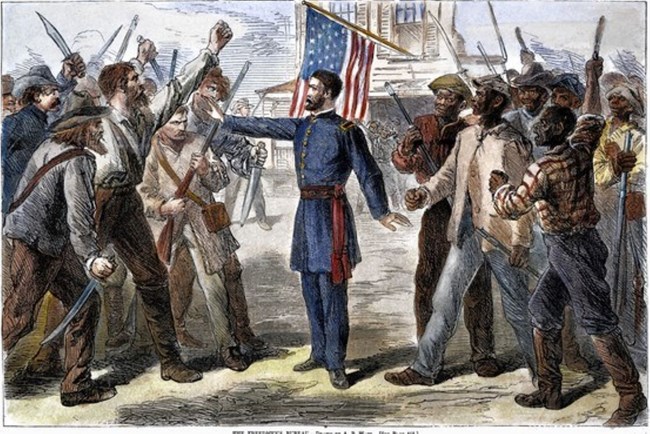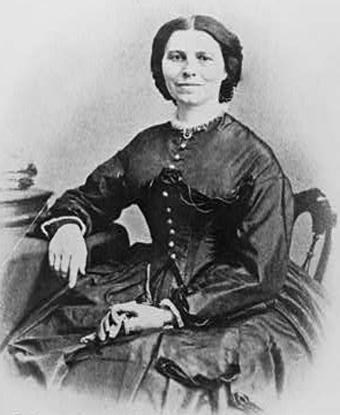Last updated: June 5, 2023
Article
Garfield Telegraph May 2023

A. R. Waud for Harpers Weekly/Library of Congress
U.S. Army couldn't bring peace to the South during the Civil War
With its army victorious in 1865, the task of readmitting the southern states into the Union was the most important concern of the national government. The United States Army played an important role in assisting in the readmission of the southern states, while at the same time protecting the newly awarded political and civil rights of the freedmen.
It was a tall order for an army increasingly short of manpower. In April 1865 there were 1.5 million soldiers. By the end of 1866, there were only 54,000 men in the army. Only 18,000-20,000 of those men were stationed in the South, which, with a population of 8 million, made their tasks difficult.
On May 29, 1868, President Andrew Johnson issued a proclamation requiring Southerners to declare loyalty to the Union, and foreswearing any allegiance to the Confederacy, in order to be eligible to vote or stand for office. Not infrequently, army officers, knowing of false declarations of loyalty, denied many Southern men the right to vote or stand for office. Such decisions created tensions between the Army and local populations.
The Radical Republicans wrested control of Reconstruction from Johnson in 1867. They were determined to punish the South for the war. They placed the South under military control. Army commanders were given sweeping powers to protect persons (blacks and their white Republican supporters) and property, remove disloyal civil officials from office and replace civil courts with military commissions.
The result of all this was that from 1867 to 1870 incidents of violence in the South were frequent. Peace was often tenuous. Blacks and white Republicans were continually under threat by white Southerners who felt they were targeted by a vindictive federal Congress.
Matters only got worse in the 1870s. Fraud at the ballot box became more common once the Democrats regained political power in the mid-1870s. Mob attacks and lynchings were employed to discourage voting by anyone other than native-born white Southerners. White Leaguers, Red Shirts, and the Ku Klux Klan were groups dedicated to this policy.
As the next presidential election approached, President Ulysses S. Grant voiced his concern that “the whole public are [sic] tired out with these autumnal outbreaks in the South…”
By the time of the 1876 election, there were fewer federal troops in the South than at any point after the Civil War. Those overextended troops could no longer effectively monitor elections. The final withdrawal of the army from South Carolina and Louisiana was a concession to the reality that military force to protect persons and property in the South had failed to bring about the social justice that Northerners sought.

Library of Congress
Clara Barton’s lifetime of service
Clarissa "Clara" Harlowe Barton was born in North Oxford, Massachusetts, in 1821, the youngest of five children. When Clara Barton was 11, her older brother David fell from a rafter in a barn. She spent the next two years caring for him by administering all of his medicines, which included the application of leeches.
In 1854, she moved to Washington, D.C. ,where she became one of only a few female clerks at the U.S. Patent Office and the only woman in her office receiving a salary equal to the male clerks.
On April 19, 1861, a trainload of Massachusetts men responding to President Lincoln's call for Union soldiers were attacked in a Baltimore, Maryland, riot. After arriving in Washington, D.C., they were sent to a makeshift hospital housed in the U.S. Senate chamber. Clara Barton brought them food and supplies and tended to their needs. Following the First Battle of Manassas, she cared for the wounded as they returned to Washington, D.C.
In 1862, after constant badgering of political and military chiefs, she was finally granted passes to the front.
Following the Battle of Cedar Mountain, she appeared at a field hospital around midnight with a wagon-load of supplies. The beleaguered field surgeon later likened her to an angel, which led to her nickname, "the angel of the battlefield."
In 1864, she was appointed by Maj. Gen. Benjamin Butler as the "lady in charge" of the hospitals of the Army of the James. After the war ended, Barton continued her humanitarian work. She established The Office of Correspondence with Friends of the Missing Men of the U.S. Army and directed a 4-year search for missing soldiers.
Clara Barton is probably best known for her founding of the American Red Cross on May 21, 1881, with the support of President James A. Garfield. She was elected its first president and led the group for 23 years.
It was her idea to incorporate natural disaster relief into the core mission of the American Red Cross. This idea was adopted by the International Red Cross.
So it may well be said that the success of the American Red Cross is largely due to the hands-on battlefield experience of Clara Barton during the Civil War.
This article is from the National Park Service. For more information, go to nps.gov/clba/index.htm
